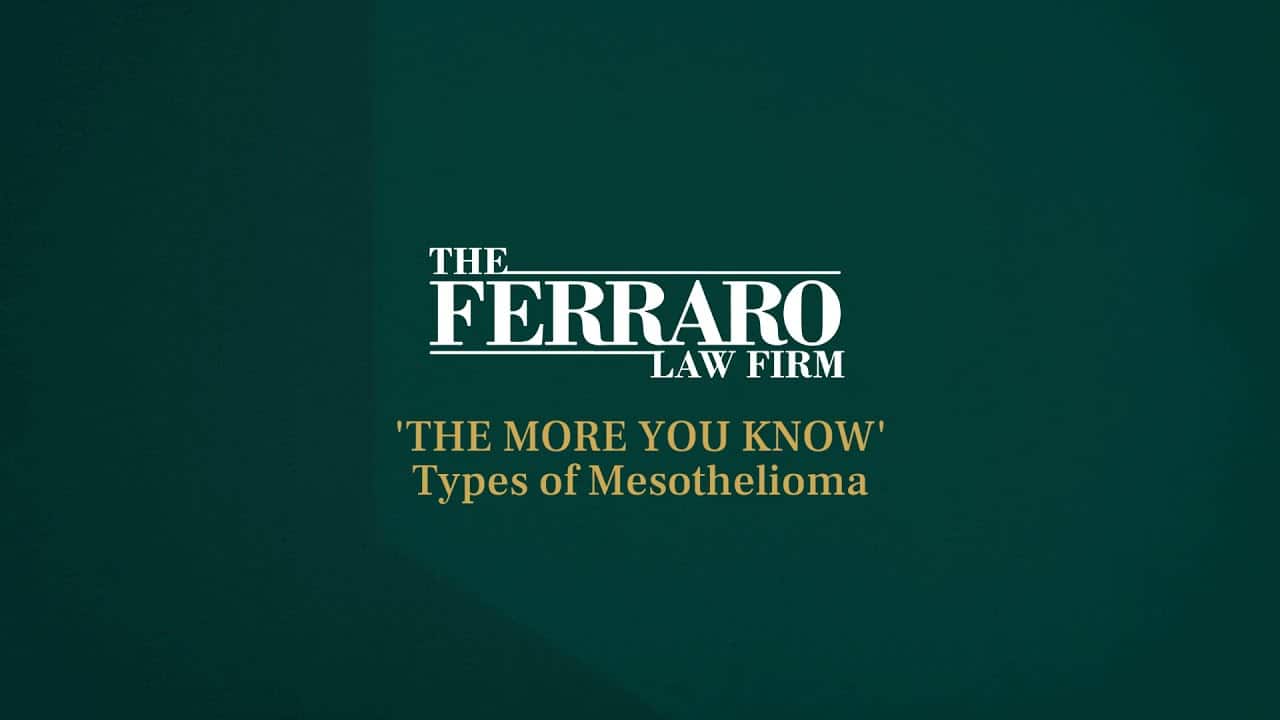If you were seriously injured, remember that it is crucial to choose the right law firm to represent your interests. We have been doing this for more than three decades, and have the resources you need to challenge any opponent.
Types of Mesothelioma
Types of Mesothelioma
Table of Contents
What Kind of Cancer is Mesothelioma?
Mesothelioma is aggressive cancer linked to asbestos exposure. Three of the most common types of mesothelioma are pleural mesothelioma, peritoneal mesothelioma, and pericardial mesothelioma.
Our skilled Florida lawyers have represented more than 20,000 clients with various types of mesothelioma and have a thorough understanding of the liability involved in these cases. Since 1985, our attorneys have recovered over $2 billion on behalf of our clients and are committed to representing future clients’ interests with the same level of dedication.
Begin a free case evaluation with the Miami attorneys at The Ferraro Law Firm, P.A. by calling (888) 554-2030.
Pleural Mesothelioma
Pleural mesothelioma is one of the most common forms of this aggressive type of cancer, which is caused by exposure to asbestos. It develops in the mesothelial lining of the lungs, known as the pleura, and accounts for about 80% to 90% of all mesothelioma cases. Although this form of mesothelioma develops in the chest and lungs, it is not diagnosed or treated as lung cancer.
Most cases involve exposure to asbestos while at work, particularly miners, millers, transport workers, insulators, builders, plumbers, electricians, mechanics, and asbestos cement manufacturing workers. You can still develop mesothelioma even if you have not been directly exposed to asbestos. For example, if you washed clothes that have asbestos fibers on them, indirect exposure can lead to the development of this disease.
Symptoms of pleural mesothelioma include these:
- Chest pain
- Shortness of breath
- Faint breathing sounds
- Harsh breathing sounds
- Dry couth
- Pleural effusions
- Coughing up blood
- Blood clotting disorders
Mesothelioma takes years to develop after exposure, which is referred to as the latency period, ranging between 20 and 60 years.
To diagnose pleural mesothelioma, the first step involves performing one or more imaging scans, such as an X-ray, CT, PET, or MRI, in order to identify the presence of any potential tumors. If detected, blood tests will be ordered to look for biomarkers, which can indicate the possibility of mesothelioma. Ultimately, a biopsy will be required to verify a diagnosis. This can be done through a thoracoscopy, thoracotomy, thoracentesis, or mediastinoscopy.
It is not uncommon for pleural mesothelioma to be misdiagnosed. Some of these misdiagnoses include:
- Asthma
- Influenza
- Pneumonia
- Chronic Obstructive Pulmonary Disease (COPD)
- Other chest cancers
There is no cure for mesothelioma. However, patients can receive treatments for mesothelioma that may extend their initial prognosis.
Peritoneal Mesothelioma
Unlike pleural mesothelioma, which is more common, peritoneal mesothelioma only accounts for less than 20% of asbestos-related cancer. It develops on the lining of the abdomen and only begins to show symptoms 20 to 50 years after one is first exposed to asbestos. Initial symptoms include abdominal pain, abdominal distension, swelling or tenderness around the abdomen, and constipation or diarrhea.
Peritoneal mesothelioma may present the following symptoms:
- Weight loss
- Hernias
- Abdominal distension
- Loss of appetite
- Abdominal swelling
- Feeling of fullness
- Fatigue
- Abdominal fluid buildup
- Bowel obstruction
If bowel obstruction is present, it may indicate the progression of tumors.
Those diagnosed with peritoneal mesothelioma typically have a life expectancy that is greater than three years, though a large part of this depends on the stage at which a patient is diagnosed. The earlier the diagnosis, the longer the life expectancy and chance of long-term survival. However, like all types of asbestos-related cancer, peritoneal mesothelioma is not curable.
Peritoneal mesothelioma is caused by asbestos exposure in two different ways:
- Asbestos fibers are swallowed and travel from the digestive system to the peritoneum.
- Asbestos fibers are inhaled and reach the peritoneum through the lymphatic system.
Given that peritoneal mesothelioma is not as common as other types of mesothelioma, clinical trials for it are not as plentiful as they are for others. However, researchers are studying the role immunotherapy may have when combined with chemotherapy, hoping that it may help control the cancer by boosting the body’s immune system. Thus far, the most successful form of treatment has been a combination of surgery and a heated chemotherapy solution, which many patients have claimed contributed to their lengthened survival.
Pericardial Mesothelioma
Pericardial mesothelioma originates in the pericardium, the lining of the heart, and can lead to the thickening of the pericardium. This type of mesothelioma accounts for only about one-tenth of all annual cases of mesothelioma.
Symptoms of pericardial mesothelioma include the following:
- Difficulty breathing
- Chest pains
The most common treatment for this form of mesothelioma is radiation and chemotherapy.
Frequently Asked Questions: Mesothelioma & Asbestos
What symptoms of mesothelioma are most common?
What are my legal options after asbestos exposure?
Trust Us-A Top Five Mesothelioma Law Firm in the U.S.
As one of the top five law firms in the U.S. for mesothelioma and asbestos litigation, The Ferraro Law Firm is trusted by many. Our extensive experience and collaboration with leading medical experts and scientists has contributed greatly to our continued success in this field. All of our clients receive personalized attention and fierce representation. In addition, our firm operates on a contingency fee basis, meaning that our clients don’t pay anything unless our lawyers obtain compensation on their behalf.
Our Florida lawyers are ready to fight on your behalf. Call (888) 554-2030 today.






